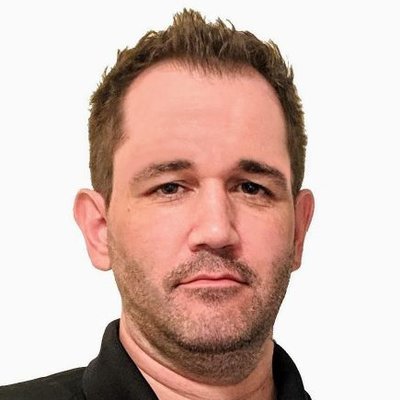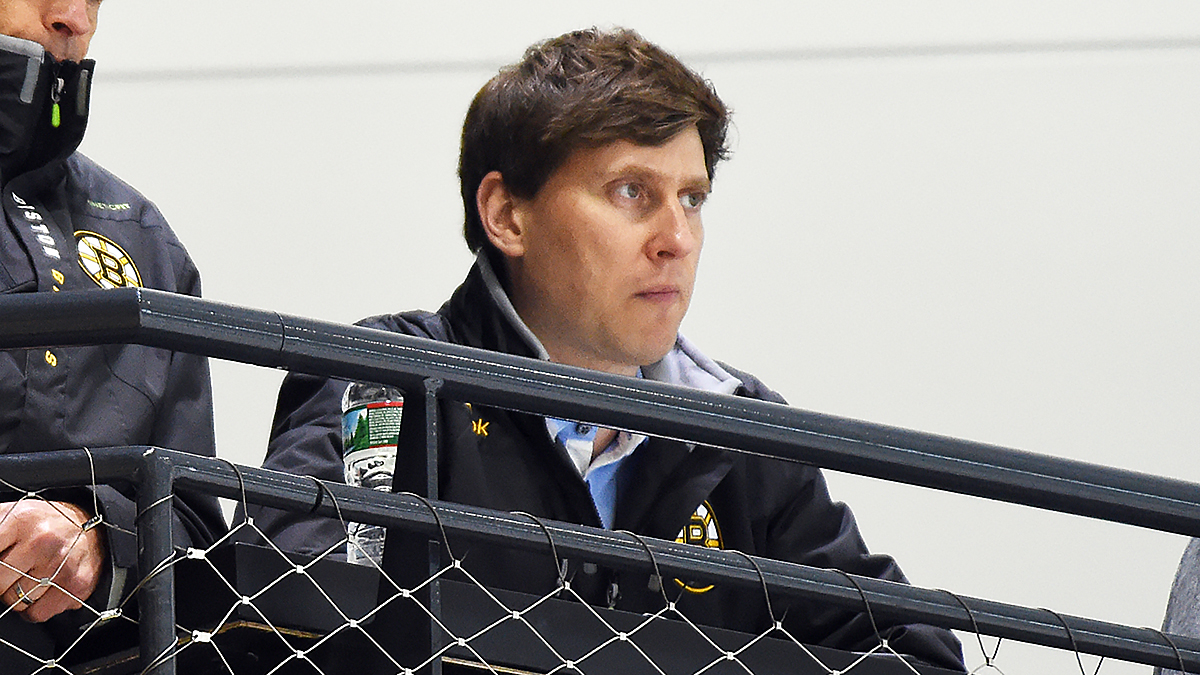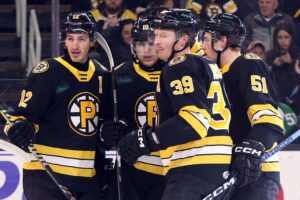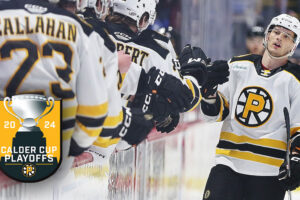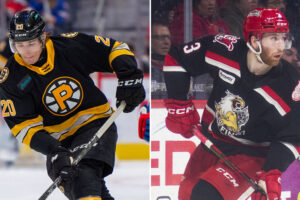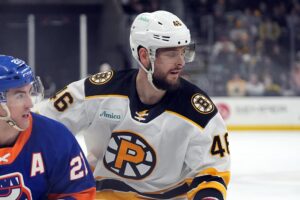📝 by Patrick Williams
A broad educational journey, followed by plenty of wide-ranging hockey tutelage, has brought Evan Gold to the general manager’s position with the Providence Bruins.
Gold was named to the post by the Boston Bruins on Mar. 29, his latest step up the hockey management ladder. Now in his eighth season with the Boston organization, Gold earned a bachelor’s degree from McGill University in Montreal and a law degree and an MBA from the University of Toronto. He spent eight seasons as a hockey operations assistant with the Washington Capitals before joining the Bruins in 2015 as the team’s director of legal affairs.
He quickly made his mark helping the Boston front office to navigate the National Hockey League salary cap, and was named assistant general manager in 2019.
With Providence finishing first in the Eastern Conference during the regular season, Boston continued its success at the AHL level with a ninth consecutive trip to the Calder Cup Playoffs. As Gold settles into his new role guiding the Boston-Providence affiliation in its league-leading 31st season, here are his thoughts on a variety of topics:
ON HIS HOCKEY EDUCATION
“When [former Providence general manager] John Ferguson was with us, he did a really great job managing [prospects], and it was really collaborative and open in terms of me trying to learn the league and the players and watching games.
“[Boston GM] Don Sweeney is the same way. If you’re getting your day job done, [he doesn’t] mind if you want to do extra work and learn more. He always encouraged that.
“Historically, from the time I joined this organization — but even personally dating back before that — there was always an opportunity given to me by some really great mentors in terms of being around the AHL and getting to learn what it’s all about.”
ON LEARNING AN ORGANIZATION’S PROSPECTS AND CONTINUALLY REPLENISHING THAT KNOWLEDGE
“It’s the next generation of NHL players, right? You’re always trying to get a head start in terms of learning those players and learning the development system.
“Coming to a new organization, you don’t know their players as well as you do the ones in the former organization. So there’s a bit of a learning curve in that sense.
“Then you’ve got a new cohort that’s joining every year, whether it’s graduating out of junior, former draft picks, junior free agents, college free agents… I think our group has done a really nice job of supplementing and giving us some pretty high-end players that have come in and made both Providence and Boston really strong groups.”
ON EXPANDING HIS PORTFOLIO BEYOND THE NHL SALARY CAP
“I think one thing that’s great about our group in Boston is there’s so many really smart and intelligent people to bounce ideas off of, to talk to. Everyone’s intellectually curious. I’m always trying to learn, trying to get smarter.”
ON A TYPICAL DAY FOR AN AHL GENERAL MANAGER
“Well, you’re collaborating with coaches and staff. You’re helping organize the group, and you’re helping communicate with the Boston leadership, coaches, management, to coordinate. Whether it’s recalls, who’s playing well, who’s deserving of an opportunity, working with all the scouts… And then also watching the games, watching the league, knowing the players, knowing where new opportunities may arise.
“Just trying to get a sense of how to continue to make our whole organization top-to-bottom better.”
ON BOSTON’S RECIPE FOR SUCCESS VIA DEVELOPMENT IN PROVIDENCE
On April 9, Boston recalled five players from Providence before its game in Philadelphia. Connor Carrick, Vinni Lettieri and Brandon Bussi were all in uniform as the Bruins won their NHL-record 63rd game of the season.
“It’s a testament to the depth of the organization, a testament to the group not just that [Sweeney] has built, but all the pro scouts, amateur scouts, college scouts, and then the job that our coaches have done.
“It’s a next-man-up mentality. That being said, those opportunities are earned, they’re not given. It’s our job to put the best players on the ice and to give everyone the best chance they can to succeed.”
ON PROVIDENCE CONTINUALLY PRODUCING PLAYERS DESPITE BOSTON NOT DRAFTING HIGH EACH YEAR
“I think it’s a testament to the people.
“It’s the players, and it’s the staff. Amateur guys, pro guys, college guys… We target high-quality people. It’s not just who can put the most pucks in the net. I think from a competitiveness standpoint, from a desire to maximize talent levels, whatever those may be — we try to find players with identities that fit our organizational ethos.
“Don’s done a great job of setting the standard in terms of what we’re looking for, and it’s our job to follow that standard. The scouts identify the players that we’re looking for, and they’ve done an outstanding job finding us not just talented players, but quality people that step right in and form that next wave for us, which is crucial.
“We have spent some draft capital. It’s certainly a strategy of ours in terms of understanding that we need to replenish organizational assets accordingly.”
ON PROVIDENCE’S KNACK FOR ALWAYS FINDING HIGH-QUALITY VETERANS
“You’ve got to value the game, understand the game, and respect the game to play it the right way, which is something our coaches talk about a lot.
“Quality people, people who love hockey, who are good people who understand their roles… Those are invaluable, because that’ll help the next group maximize their high side.”
ON MUST-HAVE CHARACTER ATTRIBUTES FOR PLAYERS IN PROVIDENCE
“You need competitiveness. You need inner drive. ‘Growth mindset’ is a term that often gets you tossed around, but I do think it’s an appropriate term.
“We sort of use ‘character’ and ‘competitiveness’ as catch-alls, but people that are really driven to maximize whatever their God-given abilities are and then to grow those abilities as well. It’s a development program first, so we’re not putting a ceiling on a player’s development. It’s all of our jobs to max out whatever they can be as hockey players, but certainly a large onus is on the player to want to do those things. We can’t want it for him.
“So from a work-ethic standpoint, from being in the gym, all those things that go into it, at the end of the day they have to be willing to do the work. We can show them a path, but the amount of adversity that a player faces when they’re a kid through junior, college, European hockey… the amount of adversity you’re going to face, you have to be willing to fight through that.
“It’s our job to identify people that are willing to, and help them through that.”
TheAHL.com features writer Patrick Williams has been on the American Hockey League beat for nearly two decades for outlets including NHL.com, Sportsnet, TSN, The Hockey News, SiriusXM NHL Network Radio and SLAM! Sports, and was most recently the co-host of The Hockey News On The ‘A’ podcast. He was the recipient of the AHL’s James H. Ellery Memorial Award for his outstanding coverage of the league in 2016.